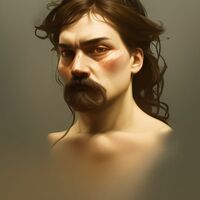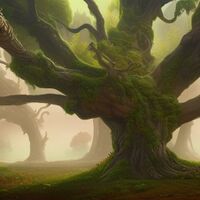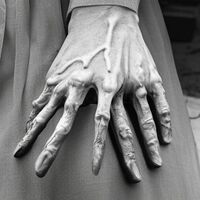Thus Spake Zarathustra
Från Svenska Dikter
Hoppa till navigeringHoppa till sökThus. My hero. These are quotes from the mentioned book.
Nietzsche was like a best friend to me before. I read his quotes over and over. I've read some of his aphorism collections, but never a novel.
So this is a first, in a long time, a grandiose story. Hope you enjoy, and some parts of the book are so much aphoristic that I could quote the whole thing.
Often, when something happens in my life, I reflect on one of his sayings. He's a real good one.
Much enjoyment wished upon thee!
II. THE ACADEMIC CHAIRS OF VIRTUE.[redigera]
- No small art is it to sleep: it is necessary for that purpose to keep awake all day.
- Ten times a day must thou overcome thyself: that causeth wholesome weariness, and is poppy to the soul.
- Ten times must thou reconcile again with thyself; for overcoming is bitterness, and badly sleep the unreconciled.
- Ten truths must thou find during the day; otherwise wilt thou seek truth during the night, and thy soul will have been hungry.
- Ten times must thou laugh during the day, and be cheerful; otherwise thy stomach, the father of affliction, will disturb thee in the night.
- sleep, the lord of the virtues!
- His wisdom is to keep awake in order to sleep well. And verily, if life had no sense, and had I to choose nonsense, this would be the desirablest nonsense for me also.
- wisdom was sleep without dreams
III. BACKWORLDSMEN.[redigera]
- The short madness of happiness, which only the greatest sufferer experienceth.
- Gentle is Zarathustra to the sickly. Verily, he is not indignant at their modes of consolation and ingratitude. May they become convalescents and overcomers, and create higher bodies for themselves!
IV. THE DESPISERS OF THE BODY.[redigera]
- “Body am I, and soul”—so saith the child. And why should one not speak like children?
- Ever hearkeneth the Self, and seeketh; it compareth, mastereth, conquereth, and destroyeth. It ruleth, and is also the ego’s ruler.
- There is more sagacity in thy body than in thy best wisdom.
- The Self saith unto the ego: “Feel pain!” And thereupon it suffereth, and thinketh how it may put an end thereto—and for that very purpose it IS MEANT to think.
- The Self saith unto the ego: “Feel pleasure!” Thereupon it rejoiceth, and thinketh how it may ofttimes rejoice—and for that very purpose it IS MEANT to think.
V. JOYS AND PASSIONS.[redigera]
- My brother, when thou hast a virtue, and it is thine own virtue, thou hast it in common with no one.
- Once hadst thou passions and calledst them evil. But now hast thou only thy virtues: they grew out of thy passions.
- All thy passions in the end became virtues, and all thy devils angels.
- Illustrious is it to have many virtues, but a hard lot; and many a one hath gone into the wilderness and killed himself, because he was weary of being the battle and battlefield of virtues.
- Man is something that hath to be surpassed: and therefore shalt thou love thy virtues, — for thou wilt succumb by them.
VI. THE PALE CRIMINAL.[redigera]
- And thou, red judge, if thou would say audibly all thou hast done in thought, then would every one cry.
- What is this man? A coil of wild serpents that are seldom at peace among themselves — so they go forth apart and seek prey in the world.
VII. READING AND WRITING.[redigera]
- In the mountains the shortest way is from peak to peak, but for that route thou must have long legs. Proverbs should be peaks, and those spoken to should be big and tall.
- Ye look aloft when ye long for exaltation; and I look downward because I am exalted.
- Courageous, unconcerned, scornful, coercive—so wisdom wisheth us; she is a woman, and ever loveth only a warrior.
- It is true we love life; not because we are wont to live, but because we are wont to love.
- And to me also, who appreciate life, the butterflies, and soap-bubbles, and whatever is like them amongst us, seem most to enjoy happiness.
- To see these light, foolish, pretty, lively little sprites flit about—that moveth Zarathustra to tears and songs.
VIII. THE TREE ON THE HILL.[redigera]
- “If I wished to shake this tree with my hands, I should not be able to do so. But the wind, which we see not, troubleth and bendeth it as it listeth. We are sorest bent and troubled by invisible hands.”
- But it is the same with man as with the tree.
- The more he seeketh to rise into the height and light, the more vigorously do his roots struggle earthward, downward, into the dark and deep—into the evil.
- This tree standeth lonely here on the hills; it hath grown up high above man and beast.
- And if it wanted to speak, it would have none who could understand it: so high hath it grown.
- Noble thou feelest thyself still, and noble others also feel thee still, though they bear thee a grudge and cast evil looks. Know this, that to everybody a noble one standeth in the way.
- Ah! I have known noble ones who lost their highest hope. And then they disparaged all high hopes.
- Then lived they shamelessly in temporary pleasures, and beyond the day had hardly an aim.
IX. THE PREACHERS OF DEATH.[redigera]
- There are the terrible ones who carry about in themselves the beast of prey, and have no choice except lusts or self-laceration. And even their lusts are self-laceration.
- Their wisdom speaketh thus: “A fool, he who remaineth alive; but so far are we fools! And that is the foolishest thing in life!”
- Were they consistently pitiful, then would they make their neighbours sick of life. To be wicked—that would be their true goodness.
- If ye believed more in life, then would ye devote yourselves less to the momentary. But for waiting, ye have not enough of capacity in you—nor even for idling!
X. WAR AND WARRIORS.[redigera]
- Let your work be a fight, let your peace be a victory!
- “What is good?” ye ask. To be brave is good. Let the little girls say: “To be good is what is pretty, and at the same time touching.”
- In wickedness the haughty man and the weakling meet. But they misunderstand one another. I know you.
- I spare you not, I love you from my very heart, my brethren in war!—
XI. THE NEW IDOL.[redigera]
- Everything will it give YOU, if YE worship it, the new idol: thus it purchaseth the lustre of your virtue, and the glance of your proud eyes.
- Sick are they always; they vomit their bile and call it a newspaper.
- Verily, he who possesseth little is so much the less possessed: blessed be moderate poverty!
- There, where the state ceaseth—there only commenceth the man who is not superfluous: there commenceth the song of the necessary ones, the single and irreplaceable melody.
XII. THE FLIES IN THE MARKET-PLACE.[redigera]
- Admirably do forest and rock know how to be silent with thee. Resemble again the tree which thou lovest, the broad-branched one—silently and attentively it o’erhangeth the sea.
- Spirit, hath the actor, but little conscience of the spirit. He believeth always in that wherewith he maketh believe most strongly—in HIMSELF!
- On account of those absolute and impatient ones, be not jealous, thou lover of truth! Never yet did truth cling to the arm of an absolute one.
XIV. THE FRIEND.[redigera]
- Art thou a slave? Then thou canst not be a friend. Art thou a tyrant? Then thou canst not have friends.
XV. THE THOUSAND AND ONE GOALS.[redigera]
- Many lands saw Zarathustra, and many peoples: no greater power did Zarathustra find on earth than the creations of the loving ones—“good” and “bad” are they called.
XVII. THE WAY OF THE CREATING ONE.[redigera]
- But one day will the solitude weary thee; one day will thy pride yield, and thy courage quail. Thou wilt one day cry: “I am alone!”
- One day wilt thou see no longer thy loftiness, and see too closely thy lowliness; thy sublimity itself will frighten thee as a phantom. Thou wilt one day cry: “All is false!”
- Injustice and filth cast they at the lonesome one: but, my brother, if thou wouldst be a star, thou must shine for them none the less on that account!
- Ready must thou be to burn thyself in thine own flame; how couldst thou become new if thou have not first become ashes!
- With my tears, go into thine isolation, my brother. I love him who seeketh to create beyond himself, and thus succumbeth.
XVIII. OLD AND YOUNG WOMEN.[redigera]
- Man shall be trained for war, and woman for the recreation of the warrior: all else is folly.
- A plaything let woman be, pure and fine like the precious stone, illumined with the virtues of a world not yet come.
XIX. THE BITE OF THE ADDER.[redigera]
av Friedrich Wilhelm Nietzsche-Förster (ris och ros)















Aktivera autouppdatering av kommentar